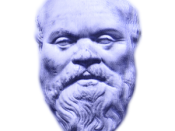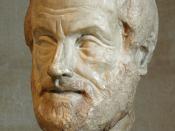According to Aristotle, the ultimate human good is happiness, which is synonymous with virtuous activity and living well. Here virtue should be defined as excellence, or doing one's life-long activities well, in accordance with completing one's proper function. Aristotle's notion of the proper function of mankind is described as the activity of the soul in conformity with virtue and principle, and is also what he considers to be the highest value. The moral criterion for completing one's proper function is to act in the same manner as a person of virtuous character. Man is not here simply to live, but is endowed with the faculty of reason and should exercise this capacity virtuously, as part of his proper function. Aristotle asserts that activity, especially right activity, is the function of man. Merely having the capacity to think rationally is not enough; rather, one must make use of this ability to determine whether or not the actions he wants to take are in conformity with excellence and virtue.
Upon doing so, he is acting virtuously and must continue this course of action for his entire life in order to be person of good character and to complete his proper function. Aristotle defines The Good as being the object at which man's actions aim and "good"� as simply being the end of one's action. While he does not consider this form of The Good to be visible, the idea is very closely associated with the proper function of mankind. A proponent of teleology, Aristotle believes in a definite right way to act, as well as the existence of a universal order. Therefore, in order to complete one's proper function, one has to be the "right"� kind of person; specifically, he must be of moral, virtuous character for his actions to be...


